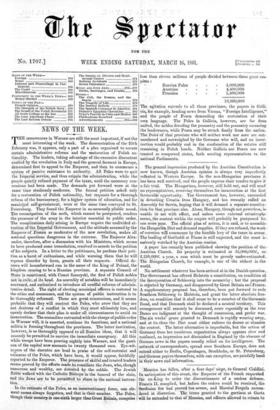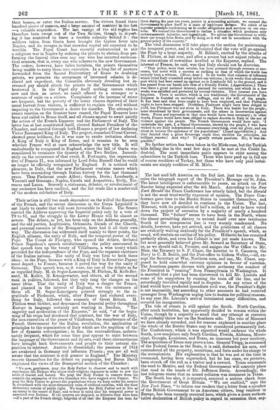'Messina has fallen, after a . four days' siege, to
General Cialdihi. In anticipation of this event, the. Emperor of the French requested the .ex-King -to order the discontinuance of a useless defence. Francis II. complied, but ,before the orders could be received, the Sardinian fire had proved too severe, and Marshal Pergola surren- dered 'at discretion. The terms granted to the garrison at Gaeta will be extended to that of Messina, and officers allowed to return to their homes, or enter the Italian service. The victors found three hundred pieces of cannon, and a large amount of materiel in the fort —a valuable acquisition. The last vestige of the old regime has therefore been swept out of the Two Sicilies, though in depart- ing it has contrived to leave a terrible calamity behind it : the soldiers taken from Gaeta have brought the typhus fever into Naples, and its ravages in that crowded capital are expected to be terrible. The Papal Court has recently endeavoured to stir a religious war in Naples by ordering the priests to abstain from per- forming the funeral rites over any one 'who has incurred ecclesias- tical censure, that is, every one who adheres to the new Government. The orders, however, have fallen harmless, the priests themselves being unable to carry them into execution. In a long list of answers forwarded from the Sacred Penitentiary of Rome to doubting priests, we perceive the acceptance of increased salaries is de- clared not expedient, the Camarilla obviously dreading lest in- creased pay should attach the priests to the Government which bestowed it. In the Papal city itself nothing occurs except now and then an arrest, an insult offered to a stranger or a sentence of exile on a citizen. Complaints of the increase of crime are frequent, but the poverty of the lower classes deprived of their usual harvest from visitors, is sufficient to explain the evil without imputing to the Government a desire for disorder. The attempts to create reaction on the frontier have ceased, the Papal Zouaves have been and called to Rome itself, and all classes appear to await quietly the action of the French Emperor and the Parliament of Italy. The latter has at last constituted itself, elected Ratazzi President of the Chamber, and carried through both Houses a project of law declaring Victor Emmanuel King of Italy. The project, remarked Count Cavour, showed great boldness, for it was sure to excite irritation abroad. A King of Italy is King of Rome, and it remains to be .seen whether France will at once acknowledge the new title. It will undoubtedly be recognized in England, where the fall of Gaeta was considered to terminate the dynasty of the Two Sicilies. Immedi- ately on the occurrence of that event, S. Fortunate, the representa- tive of Francis II., was informed by Lord John Russell that he could no longer be officially recognized by England. It is noticed with pleasure, in Italy, that the new Parliament contains names which have been resounding through Italian history for the last thousand years. Thus Piedmont sends Alfieri; Genoa, Doria ; Lombardy, a "Visconti and Gonzaga ; Naples, Carafa and Acquaviva ; Sicily, Tor- rearsa and Lanza. Scarcely a statesman, debater, or revolutionist of any eminence has been omitted, and the list reads like a muster-roll of the modern celebrities of Italy.































 Previous page
Previous page